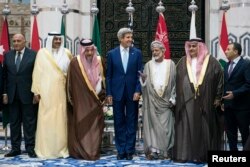U.S. intelligence says the Islamic State militant group has between 20,000 and 31,500 fighters on the ground in Iraq and Syria.
A Central Intelligence Agency spokesman said Thursday this is much higher than the previous estimate of 10,000.
He says the new estimate reflects stronger recruitment by the Islamic State since June following success on the battlefield and the declaration of a caliphate in Iraq and Syria.
Earlier Thursday, ministers from 10 Gulf and Arab nations said Thursday they are committed to joining the United States in a "coordinated military campaign" against Islamic State fighters who have seized large swaths of Iraq and Syria.
After talks in Jeddah, Saudi Arabia with Saudi officials and U.S Secretary of State John Kerry, officials from the Gulf Cooperation Council, along with Egypt, Iraq, Jordan and Lebanon, said they are united against the threat from all terrorists, including Islamic State, also known as ISIS or ISIL.
The GCC countries represented in the Red Sea port city, the Saudi government’s summer home, included Saudi Arabia and its rival Qatar, along with Bahrain, the United Arab Emirates, Kuwait and Oman.
Non-Arab Sunni Turkey also attended the talks. But two other powerful regional powers, Shi'ite-ruled Iran and Syria, were excluded, a sign of how strong the Middle East's sectarian divide remains.
The Arab states agreed in a written communique to take many of the steps U.S. President Barack Obama spelled out Wednesday in his newly articulated strategy for wiping out the militants - stopping the flow of foreign fighters, cutting off funds for Islamic State, providing humanitarian aid to those terrorized by the militants and rejecting what the ministers call their "hateful ideology."
The ministers hailed the new Iraqi government and its pledge to advance the interests of all Iraqis, regardless of religion, nationality or sect.
Kerry and Obama have called the new unity government in Iraq a key to destroying IS.
Saudi clout
The Saudis, who are hosting a series of meetings with regional leaders, are key to the new coalition because of their country's size, location and economic importance, "but also because of their religious significance with Sunnis," according to a senior State Department official at the talks.
Saudi Arabia's primary role in the Sunni world is a major element in the U.S. plan to create a broad coalition against the militant group.
U.S. officials also look to the Saudi kingdom to help bridge the Sunni-Shia divide, which is complicating efforts to confront Islamic State militants, specifically in Iraq.
Saudi Arabia has come to understand the Islamic State group is a serious threat to their country as well – that it isn’t a mainstream Sunni movement.
One element of Obama's IS plan seeks to undermine the ideological and religious claims that the Islamic State militants make to Islam.
The administration hopes Riyadh will use its influence among Islamic religious leaders.
The coalition may need enhanced military basing and overflight rights for airstrikes against the Islamic State, the State Department official said. Saudi Arabia already has agreed to allow camps for training vetted moderate rebels to fight the IS insurgents.
The official said Kerry was asking Arab leaders to use nationally-owned media – including Al Jazeera and Al Arabiya – as well as their religious establishments to speak out against Islamic State extremism in hopes of undermining its appeal to young recruits.
In that push, Kerry echoed Obama's denunciation of the IS (ISIL) group as not "Islamic" because no religion condones the killing of innocents.
"ISIL claims to be fighting on behalf of Islam, but the fact is that its hateful ideology has nothing to do with Islam," Kerry said.
"ISIL is a manifestation of evil, a vicious terrorist organization, and it is a organization that achieves its goals only through violence, repression and destruction, fed by illicit funding and a stream of foreign fighters," he added. "It has seized territory and terrorized the people who live there regardless of their sect or ethnicity."
Diplomatic push continues
The top U.S. diplomat will continue his coalition-building efforts Friday in the Turkish capital, Ankara, in meetings with President Recep Tayyip Erdogan, Prime Minister Ahmet Davutoglu and Foreign Minister Mevlut Cavusoglu.
Kerry will also stop in Egypt as part of the effort to line up international support against the Islamic State militants.
The Mideast diplomatic push comes ahead of a conference set for Monday in Paris on how to stabilize Iraq. That meeting will include officials from the U.S., Britain, France, Russia and China, and possibly other nations, even including Iran.













